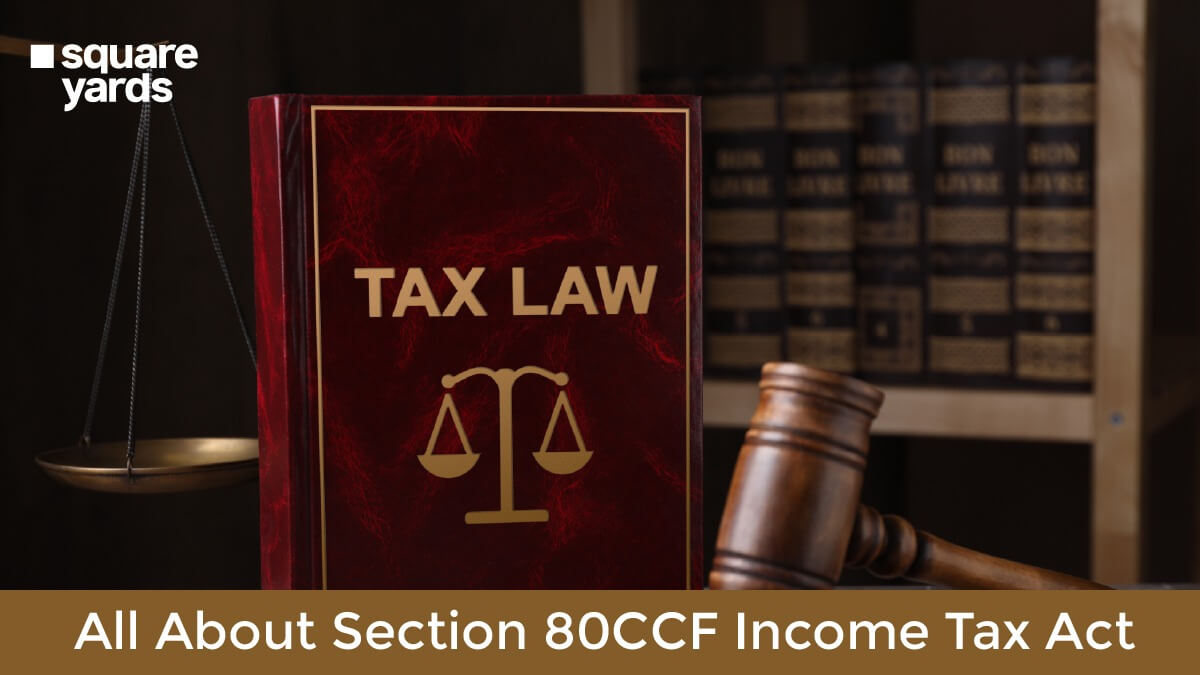Investors who adore making money by investing and saving by choosing the right technique for taxable earning are the wise ones. This is because they acknowledge the Income Tax Act’s provisions that offer exciting options to pay tax cost-effectively.
Here is one such clause that made saving money on tax Legal! You read that right. Learn the below information and get the best insight that might help you know what and how to be done to enjoy an unimaginable benefit towards the end of each fiscal year.
Table of contents
- Section 80CCF Income Tax Deduction
- What is Section 80CCF?
- Eligibility for Tax Deduction under Section 80CCF
- Document Requirement to Claim the benefits under section 80CCF
- Which Bonds are Eligible for Deduction Under Section 80CCF?
- Important Facts to Keep in Mind
- End Thoughts
- Frequently Asked Questions (FAQs)
Section 80CCF Income Tax Deduction
Brought into the Indian Constitution in 2010, Income Tax Department brought it into action in 2011, where deductions on government-approved real estate bond schemes commenced. However, a re-introduction of the clause was made to uplift the nation’s infrastructural investments. It also brought interesting leniency for the taxpayers.
Let us jump into the deep sea of tax savings and potential investment plans available in the market that were aliens to us before.
What is Section 80CCF?
Section 80CCF is a legal provision under Chapter VI-A of the Income Tax Act, meant for calculating the deduction as stated in the section for configuring Gross Total Income. In this, a bunch of deductions are just a part of Section 80C that deals with investments made on verified infrastructure bonds by a taxpayer. The main job of 80CCF is to let taxpayers have deductions up to Rs. 20,000 each year on their total sum of tax-paying the amount.
Don’t miss It!: Section 80CCG
Eligibility for Tax Deduction under Section 80CCF
The eligibility criteria of Section 80CCF, Income Tax, have been listed below to make you take a quick step:
- 80CCF deductions are only applied to Indian residents who can claim tax benefits under Section 80C, Income Tax Act. This means no NRIs/foreigners can take the privilege.
- The deduction is only offered to individual investors. This means the clause does not apply to companies, joint veneers, sole proprietors or any type of group or business associations.
- This provision allows only Hindu Undivided Families to avail of the investment perks.
- Two or more investors can make a joint investment. Although, the primary stakeholder/stakeholders will only avail of the benefits on deductions.
- Tax benefits can be claimed by investment in tax-saving bonds that are Government approved corporations or any financial institution.
Document Requirement to Claim the benefits under section 80CCF
Here is the mini yet complete requirement you need to ensure while claiming Section 80CCF, Income Tax Act.
- A valid government-approved ID proof
- Authentic pieces of information about banks
- Details of PAN Card
Which Bonds are Eligible for Deduction Under Section 80CCF?
Infrastructure bonds are such investments that are considered to claim 80CCF as per the Income Tax Act. This is the only bond eligible for the deduction by a taxpayer. It is a way to encourage investments in infrastructure. In addition, the tenure should be a minimum of 5 to 10 years.
Also Read: 80CCC of Income Tax Act
Important Facts to Keep in Mind
Here are a few things to keep in mind before you invest in infrastructure bonds and avail of the deduction by claiming Section 80CCF:
- The interest on government-approved infrastructure bonds or any other type of tax-saving bonds is taxable for the taxpayers.
- The tenure of the bonds is mandated to be 5 years.
- Besides completing the lock-in tenure, investors might sell out their bonds.
- If investors choose to sell, the bonds must be in physical or demat format.
- Investing in multiple bonds will not give an additional advantage on deductions while calculating the total payable tax.
- Only individuals who fall in the category of Hindu Undivided Family may claim the deduction by Section 80CCF.
End Thoughts
Section 80CCF is a smaller section that defines the possibilities of claiming deductions on tax payable to the government by a taxpayer. However, hundreds of other clauses also allow a taxpayer to safeguard their interest and save their finance legally.
Read
Frequently Asked Questions (FAQs)
What is the 80CCF deduction limit?
Under Section 80CCF, a taxpayer can claim a deduction of up to Rs. 20,000 each year, calculated on their total tax payable amount.
Are interest earned via Section 80CCF deductions taxable?
Yes, investing in infrastructure bonds for 5 years to 10 years is great, yet the interest is taxable for the investors.
Can an NRI claim a Section 80CCF deduction?
Non-resident Indians are not allowed or eligible to claim Section 80CCF deductions. Only residents of India who are a part of Hindu Undivided Family can claim the same.
Can business firms claim tax deduction according to Section 80CCF?
No group of people or a business association can claim a Section CCF deduction. It is meant to be utilised by only individual residents of India.













































